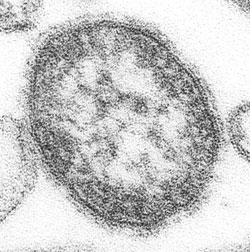 |
| The measles virus--Courtesy of CDC |
In December, Serum Institute of India reported victory in a Phase I trial of its powdered measles vaccine. But now, it may have to go back to the drawing board, as results from a noninferiority trial reported Thursday showed that one dose of the powdered candidate was not as effective as one dose of the traditional injected vaccine.
The study, funded by the Bill & Melinda Gates Foundation and published in the New England Journal of Medicine, involved 2,004 children aged between 9 and 12 months. About half of them received the traditional jab, and the other half received the aerosolized inhaled vaccine. The inhaled vaccine did provoke an immune response, but one that was not as robust as that produced by the injected vaccine.
Serum already manufactures an injected measles vaccine as well as one for measles and rubella. It announced in 2012 that it would donate 20 million doses of the latter to GAVI.
But a powdered vaccine could still fill a niche in developing countries. Its injected vaccines are freeze-dried, and so they need to be reconstituted with clean water, which can drive the cost up. Other vaccines need to be refrigerated.
Serum has been working to undermine Big Pharma's grip on the vaccine industry by developing low-cost alternatives for pertussis, HPV and tuberculosis, among others. Fellow Indian company Hilleman Laboratories, Merck's ($MRK) JV, is developing a powdered vaccine for cholera, which could undercut Sanofi's ($SNY) Shanchol.
- here's the study abstract